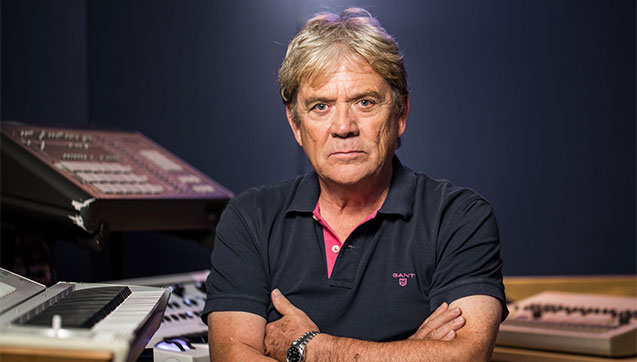Dubbed the 'Hit Factory’, the trio enjoyed a consecutive run at the top of the charts, with the artists they discovered going on to achieve world chart domination.
Mike first clicked with outliers from the high energy scene like Divine and Pete Burns, turning them into household names overnight with classic pop confections that even your granny could bop along to.
Then came Mel and Kim, Kylie, Jason Donovan, Rick Astley, Sonia – pop pin-ups who all landed within the space of about five years and went on to define the era. For some, it led to lasting careers, with Kylie still one of the world's highest grossing female artists.
Mike still continues to write and produce to this day, most recently orchestrating a return to studio form for eighties’ icons The Fizz (formerly Bucks Fizz).
Here, he shares his pop wisdom gleaned from many, many years at the business end of the charts…
When did you first get in to making music? What was the impetus?
I was quite young when I actually started to write songs, about seven years old. Then, when I was about nine, The Beatles happened. By that point I knew of songwriters, people like Irving Berlin, Rodgers & Hammerstein, and even Tin Pan Alley. They were people in a backroom writing the songs and then the singer takes them on.
When The Beatles came along, I found out they wrote their own songs. That was a bit of an eyeopener for me. I had a guitar, there was a piano in the house, and I taught myself their songs.
You mention Tin Pan Alley – was that the model you intended to follow with Stock, Aitken and Waterman?
Yes it was really, and although people used to say to us that we were formulaic or that all our songs sounded the same, they didn’t actually. If you look over the span of our output, the Kylie records all had a distinct sound and the high energy dance stuff was in another style.
I do recall, back in the day, the idea of a singer like Frank Sinatra writing his own songs was irrelevant. Elvis didn't write songs, it wasn't important. What was important was ensuring your manager found you the best songs to sing. That's what the A&R and management did, they would go round and find the best writers and then hand those to the best singer. To be a great singer doesn't automatically mean you're a great writer and I think that's where The Beatles disturbed the process.
I was desperate to be a successful writer. I had a unshrinkable belief in my own ability to write songs, I thought that I could do it and I thought I could do it to order. This is the difference between between us - Stock, Aitken and Waterman - and, say, Liam Gallagher or Paul McCartney, who are mainly writing for themselves: they have to keep within their sphere.
I don't mind writing for 16-year-old girls or female impersonators like Divine. In fact I really work best this way. If someone says to me, ‘I've got a 12-foot circus freak who wants a song for a bearded lady,’ I'm off and running. I like doing bespoke songs. That's really what we did when Kylie came into the room. I saw who she was.
I would advise any writer to have more than one reason for writing a song. Don’t just sit down with a piece of paper and say, ‘I'm going to write a song’. That's not good enough. You've got to write a song with an aim in mind. For me, that was to write a song for Kylie. Then I analyse who she is and what she is and I try and write a song that really fits her, that says something about her.
How do your songs start life?
I usually start from a title, and the rest of the song fits around that, assuming I've got to understand who the person or band or singer is... I’ll have chatted to them beforehand to get a feel for them. That way, I can make a bespoke job of it.
The problem is, you can't keep that going for very long… Once you've done a couple of successful songs, the artists take on their own world. The system takes over and you’ve got to try and add some variety, a ballad, a faster song, different styles to mix it up a bit.
With something that is really tailormade. With Stock, Aitken and Waterman, that’s totally where we were at. Rick Astley is a good example. I didn't know who he was or what he was, but I listened to his voice and got to understand him. Someone suggested he do an old Motown cover but I thought, ‘God, this guy's better than a cover. We've got to write something for him.’
He told us about his girlfriend, who he'd known since he was five. A story of fidelity began to emerge so we wrote, Never Gonna Give You Up, to suit his voice, the pitch of it, the range of it and the strike of it.
What do you notice about hit songs today? Are there major differences?
Well, the big thing is that nearly everything is digitised. I'm going to speak in general terms now, but here’s how I see the process: the song has probably been written by someone who sees themselves as a producer more than a writer. They’ve got a mouse in hand, controlling Logic. They have a few sample drum loops, maybe a bass line from somebody else's work or a sample of a chord structure…
Potentially, they call in a singer, who's a friend. Then they transfer the song into a mix scenario, where they probably use something like Pro Tools to chop it all about and pull it into shape.
After that they’ll punch it up to maximum volume so they brick-wall the mix. That way, when anybody plays it, it's at full volume – but it has very little dynamic range. The end result is that most people hear it on tiny earbuds off their iPlayer at 16 or eight-bit… My point is, at the end of it all, everyone’s listening to mp3s...
So at the end of the day, I still think it's right thing to make the highest quality recording you can – but where it ends up is up to everyone else. What I’m trying to say is that sound quality these days isn't as dynamic as it used to be. There's no high fidelity, so you record a piano these days and it's probably been messed about by all the plug-ins you get, which is another layer of digital conversion. It's been converted from analogue to digital, so many times, back and forth, it's like the bread theory: when you chop up two loaves of bread that were equal in size and put it back together, it’s not as big as the original loaf. Digital sampling is like that.
You have to believe in yourself. But you have to have some evidence for that belief, as well. You can't just sort of blindly think you're going to be successful as a writer, unless you have written something that leads you to that belief.
Then I think you've got to learn some rules and then find out how to break them. You don't know you've broken them if you didn't know them in the first place! You need to know how far you’re stretching, twisting and pulling convention. Learn just how far to stetch things before it all goes completely wrong.
What, for you, is the definition of pop?
I think, humans are humans and a good pop song is universal. I won't ever sit down and try to write something specifically for 15-year-olds to listen to, or 30-year-olds, or English people, or whatever. People are people and a great song with a great singer reaches humans across the board. I think that's the definition of pop really.
And how to write that perfect pop record?
I would try to use universal themes, don’t be too specific or party political - avoid all of those pitfalls. I wouldn't use swearing or something very sexually direct. Every pop writer should be aiming to write a classic song that will live on for 20, 30 years or more. If you start date-stamping it with modern lingo or disgusting language or some form of party politics, your song, it's never going to last.
http://www.mikestockmusic.com/





